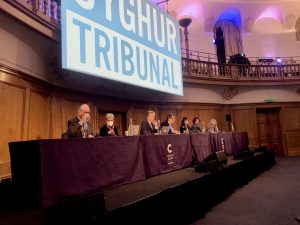On December 9, the U.K.’s Uyghur Tribunal found the Chinese government guilty beyond a reasonable doubt of committing genocide, crimes against humanity, and torturing Uyghurs and other minorities in northwest China. This is a momentous occasion for fighting grave human rights abuses. The U.K. government now must take the necessary steps to condemn these atrocities at the very highest level, sanction the Chinese government, and restate their dedication to protecting the Uyghur community.
This decision could not have been announced on a more significant date. December 9 marks the International Day of Commemoration and Dignity of the Victims of the Crime of Genocide and the Prevention of this Crime. This day marks 73 years since the 1948 Genocide Convention and signifies the international community’s commitment to “Never Again.” That the Uyghur Tribunal announced its decision on this day is very fitting and situates the ruling within a historical context. As the Uyghur Tribunal implored, it is now vital that the U.K. take a leading role in publicly recognizing the genocide, taking the appropriate actions and sanctions, and committing to the call for “Never Again.” A crime unpunished is a crime downplayed and a crime encouraged. Unless the U.K. government takes tangible actions in condemning the behavior of the People’s Republic of China (PRC), they tacitly encourage genocides for years to come.
The Uyghur Tribunal, chaired by Sir Geoffrey Nice QC, facilitated the gathering of evidence from both victims and experts in order to assess whether the Chinese government had committed genocide against the Uyghurs and other ethnic minorities. Held at the request of the World Uyghur Conference, the Tribunal sought to bring international attention to the horrendous crimes and “galvanize international action on the alleged abuses and hold them to account.” As noted by human rights campaigner Luke De Pulford, “With all traditional routes to international courts blocked, the tribunal represents one of the only ways China’s alleged crimes against humanity and genocide can be examined. More than that, while political will to hold China accountable remains shockingly low, the tribunal – a people’s tribunal – signals the determination of ordinary citizens to ensure the Genocide Convention does not become a meaningless document.”
The verdict concluded that the Chinese government was responsible for deliberately lowering the birth rates of Uyghurs, which it argued was indicative of the Chinese state’s genocidal intentions. In announcing the judgment, Nice said, “The tribunal is satisfied that the PRC has affected a deliberate, systematic and concerted policy with the object of so-called ‘optimizing’ the population in Xinjiang by the means of a long-term reduction of Uyghur and other ethnic minority populations to be achieved through limiting and reducing Uyghur births.” This falls under article 2d of the U.N. Convention and Prevention of the Crime of Genocide: “Imposing measures intended to prevent births within the group.”
The tribunal also ruled that the government was guilty of crimes against humanity, such as rape and forced sterilization, particularly of Uyghur women. With regards to state responsibility for the crimes, the verdict argued that “the tribunal is satisfied that they have occurred as a direct result of politics, language and speeches promoted by President Xi and others.” It also found that “these policies could not have happened in a country with such rigid hierarchies as the PRC without implicit and explicit authority from the very top.”
Now that the verdict has been announced, what are the potential next steps for the U.K. government?
The U.K. government must take immediate action in line with its international legal obligations, particularly the U.N. Convention and Prevention of the Crime of Genocide, by punishing the perpetrators and preventing further crimes of genocide at all costs. Those at the Uyghur Tribunal’s Press Conference, such as Sir Iain Duncan Smith, Lord Alton, and MP Nusrat Ghani, offered potential ways to enforce this. Smith called for the imposition of Magnitsky-style sanctions on those who are directly and closely involved in the perpetuation of genocide. He also called for all imports from Xinjiang to be stopped, a re-examination of export controls, and the sanctioning of individuals such as Xinjiang Party Secretary Chen Quanguo, the “architect” of the genocide. Other potential measures put forward at the press conference included a full diplomatic boycott and the call to stop companies operating in the U.K. that have links to the genocide – for instance, Hikvision, a company already banned in the United States.
A further course of action remains to be discussed both in the U.K. House of Commons and the House of Lords, but the U.K. government has no excuse to turn a blind eye to this global catastrophe any longer.

































